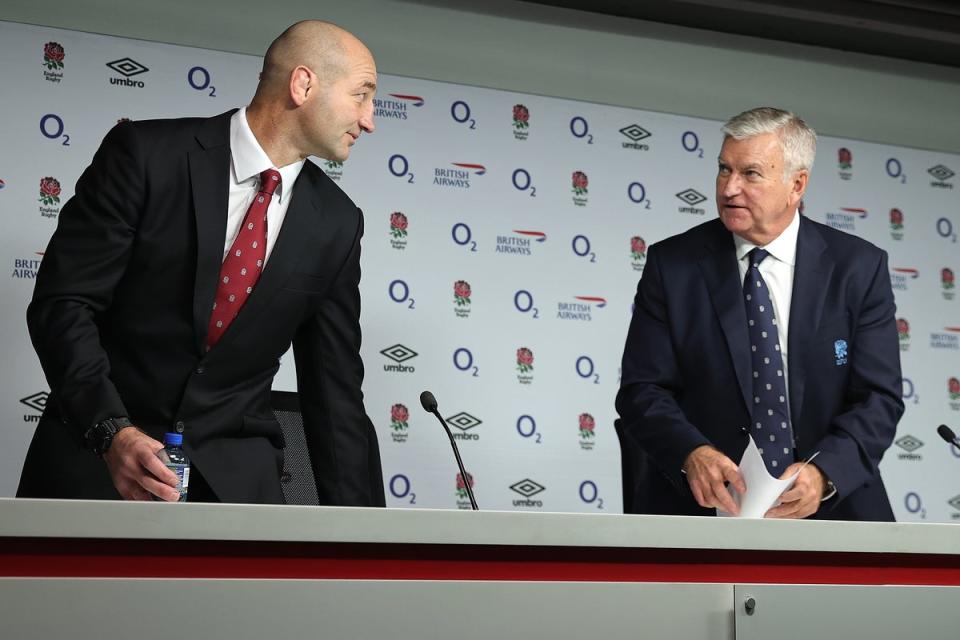Former RFU remuneration chief defends Bill Sweeney’s bonus payments amid record loss

The former chair of the Rugby Football Union’s remuneration committee has defended the process that led to Bill Sweeney and other executives being paid significant bonuses.
Chief executive Sweeney has been heavily criticised after receiving a bonus of nearly £400,000 in a year in which the RFU made a record loss of £38m, with chair Tom Ilube stepping down amid a furore over pay.
The bonus paid to the former British Olympic chief swelled his annual earnings to £1.1m, and came as a result of a Long Term Incentive Plan (LTIP) agreed after the Covid pandemic.
The RFU are reviewing executive pay after widespread uproar over the figures, which came after Sweeney met or partly met a number of criteria. An attempt to force a special general meeting on Thursday, co-ordinated by the Rugby Football Referees’ Union (RFRU) and involving Championship clubs, claimed to have the support of far more than the required 100 clubs.
However, the attempt was batted away by the RFU, who suggested that the rebels had not complied with the relevant requirements to action such a meeting, and the letter received contained “a number of inaccuracies”.
Genevieve Shore was chair of the remuneration committee that agreed to the LTIP, which rewarded a number of executives who took pay cuts during the pandemic.
And the experienced administrator, who served on the RFU board between 2017 and 2022, has defended the running of the organisation and awarding of the bonuses.
“I’m extremely comfortable with all of the governance that took place at the time, and the communication that took place,” Shore, who has been appointed executive chair of Premiership Women’s Rugby (PWR), said before news of the latest rebellion broke. “What happened after 2022, I obviously don’t know, but I feel like it was all set up and in a good place.
“I feel the RFU board is run incredibly professionally and lives up to any FTSE 100 standard. I think if the executive team have hit the targets that were set for them, that’s all you can ask.”

Shore won the World Cup with England in 1994 and has since served as a non-executive director on a number of boards across a range of industries.
Among the LTIP’s objectives was to retain senior staff, a goal that Shore feels was achieved despite the departures of Simon Massie-Taylor and Sue Day, who were both seen inside the organisation as possible successors to the 68-year-old CEO Sweeney.
Massie-Taylor became chief executive of Premiership Rugby in 2021, while COO and CFO Day departed last year to take up a role overseeing women’s football at the Football Association (FA).
“I’ve worked across remuneration in many organisations,” Shore explained. “Our challenge was, ‘can we come out of Covid and retain that team through Covid?’. Simon was, I think, a bit of a one-off, because he was offered the prime job. He’s done a brilliant job at PRL. He really has done an absolutely outstanding job there.
“But the LTIP did what it was meant to do – the majority of the team stayed during that time period. The job of an executive team and a board is to build succession planning and make sure you do have a fairly seamless transition after an LTIP. You either re-up, or you change your team. That’s always a fine-grain decision that an executive team has to make.”

Sweeney has not spoken publicly since the publishing of the RFU’s annual accounts in late November. Bill Beaumont has been installed as interim chair after the departure of Ilube, provided his appointment is ratified by the council on Friday.
100 member signatures are required to call for a special general meeting (SGM). Constitutionally, the RFU board can block a call from the membership to sack the chief executive, with only the chair able to be removed by the clubs.
The RFRU are understood to have been contacting clubs directly in order to generate more support for their uprising.
“The RFU can play for time all it likes, but this is a mass movement by a stronger, united team,” a spokesperson said on Thursday evening. “Splitting hairs about the rules of what is or isn’t a valid complaint form is merely postponing the inevitable.”

